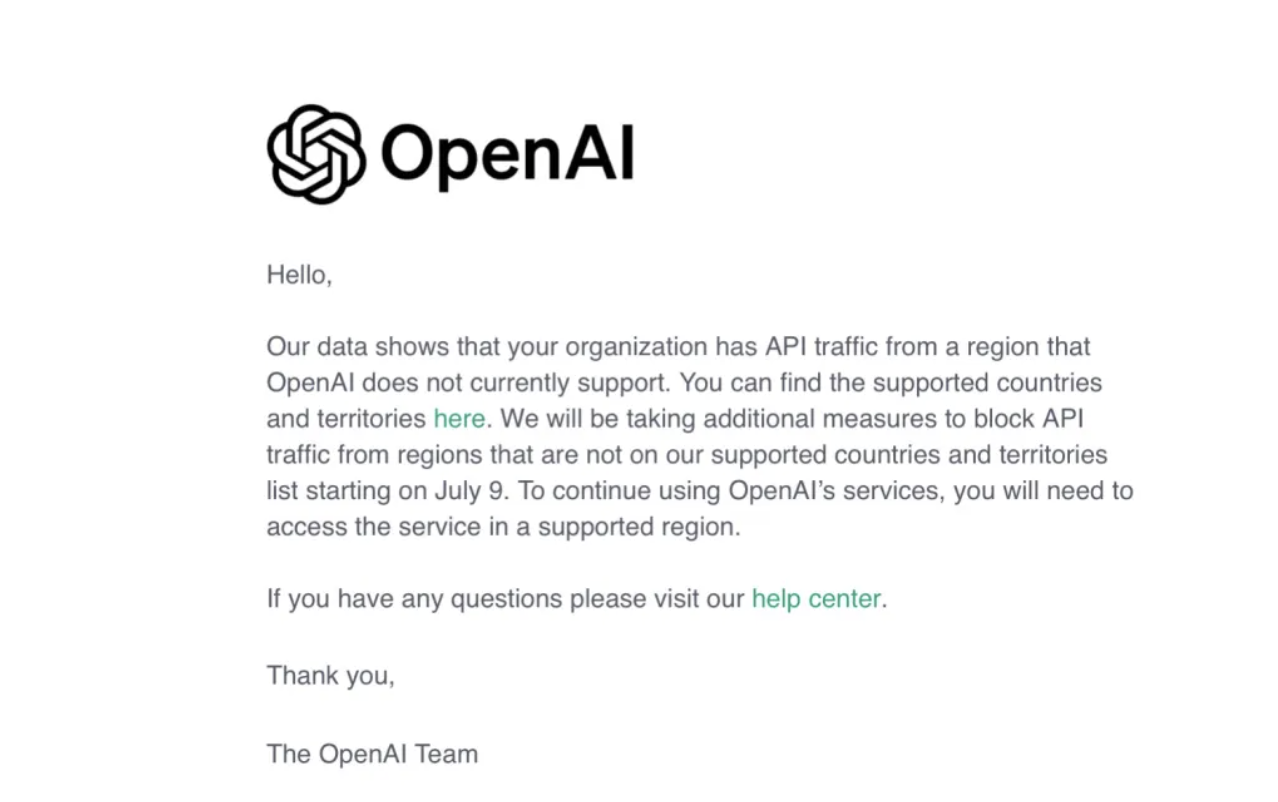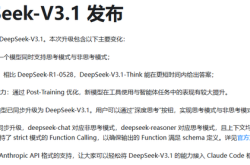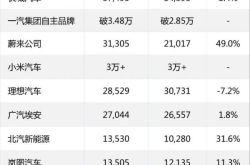OpenAI Suddenly Cuts Off API Supply to China, Practitioners: Not a Significant Impact, Domestic Large Models Are More Affordable
![]() 06/26 2024
06/26 2024
![]() 596
596
Blue Whale News, June 25 (Reporter Lu Pengpeng) The sudden "cut off" of OpenAI API supply to China, will domestic shell companies be significantly affected? The fact is not the case.
OpenAI announces the termination of API services to China
According to Caixin News, early in the morning of Tuesday, June 25, Beijing time, API developers from various countries and related regions, including mainland China, have gradually expressed on social media that they have received a "warning letter" from OpenAI.

The email image shows: "Our data indicates that your organization's API traffic originates from a region that OpenAI currently does not support. You can find the supported countries and regions here. We will take additional measures starting from July 9 to block API traffic from regions not on our list of supported countries and regions. To continue using OpenAI's services, you need to access the services from a supported region."
According to the information provided on the OpenAI official website, China is not among the countries and regions supported by OpenAI API services.
Blue Whale News reporters learned from multiple AI large model practitioners that they did indeed receive this email.
In March 2023, ChatGPT developer OpenAI announced the opening of its API, allowing third-party developers to integrate ChatGPT into their applications and services through the API.
API (Application Programming Interface) is an application programming interface that can be used externally through calls. Simply put, third-party developers can integrate ChatGPT capabilities into their applications and build their own AI software after accessing it.
Practitioners: Not a Significant Impact
As a leading company in the field of artificial intelligence, OpenAI has attracted a large number of users with its leading technology in recent years. Its revenue business can be roughly divided into three parts: one is subscription service fees charged to C-end users; the second is API call services provided to enterprise-end developers, which is also OpenAI's core business; and the third is revenue sharing from Microsoft Azure cloud services.
With these three businesses, the company generated $1.6 billion in revenue in 2023, and the annualized revenue for the first six months of 2024 reached $3.4 billion.
In fact, OpenAI had not previously provided services to the Chinese market nor opened registration and usage to Chinese users. Chinese developers mainly use OpenAI through two channels.
The first is to apply for "Azure OpenAI Services" through Microsoft Azure to call the GPT model, which is also the only compliant channel in China. Obtaining services through Microsoft's official partners can provide enterprises with compliant and stable access to ChatGPT functionality.
The second is to connect to the API provided by OpenAI officially, but there is a high probability that this method will be blocked.
Some analysts believe that after the release of OpenAI's restrictions, it will affect to some extent those developers who rely on OpenAI's large model shells. After July 9, websites or apps that call the OpenAI API may face service disruptions.
In this regard, some AI large model practitioners told Blue Whale News reporters that first, this measure mainly targets B-end large model developers and does not affect the usage of C-end users.
Secondly, shell companies have many countermeasures, such as using overseas servers to bypass restrictions and access APIs. Another example is creating a reverse proxy to access ChatGPT's API. A reverse proxy is a secure request forwarding technology that can hide the actual server address. Third-party platform APIs cannot be restricted, so even if OpenAI imposes regional restrictions, the interface can still be called.
Finally, even if OpenAI's API is not used, other domestic large model APIs are not bad now. Although they are not as intelligent as OpenAI overall, most users will not feel much difference. In fact, many small domestic start-ups have already switched their interfaces to domestic large models, and many domestic large models outperform GPT in understanding Chinese content. Therefore, OpenAI's restriction measures have little impact on the domestic market.
The Rise of Domestic Large Models as Alternatives
More Affordable Prices
According to Global Times, the US Treasury Department announced a 165-page draft on the 21st, intending to restrict investment in China's high-tech industry. Foreign media speculated that the investment restrictions signed by US President Biden may take effect before the end of this year. Domestic experts believe that Washington's move will accelerate the "decoupling" of the US from China in the high-tech field, but it will also inspire China to strengthen its determination to innovate independently in science and technology.
As experts have said, OpenAI's restrictions will force Chinese large model companies to accelerate independent research and development. In fact, the current open-source models in China are fully capable of supporting the development of Chinese AI applications, and prices continue to decline.
On the eve of this year's 618 shopping festival, domestic large models have launched a fierce price war. Ali's Tongyi Qianwen, Baidu's Wenxin, Tencent Cloud's Hunyuan, iFlytek's Xunfei Spark, ByteDance's Doubao, and others have all reduced their model prices.
The price reduction of domestic large models has reduced developers' usage costs, lowered the market threshold, and provided more entrepreneurial opportunities for small and medium-sized enterprises in the field of artificial intelligence. It can be seen that the significant price reduction of domestic large models has become a general trend in the industry, and this trend will continue in the future with the improvement of computing power and continuous progress in algorithms.







